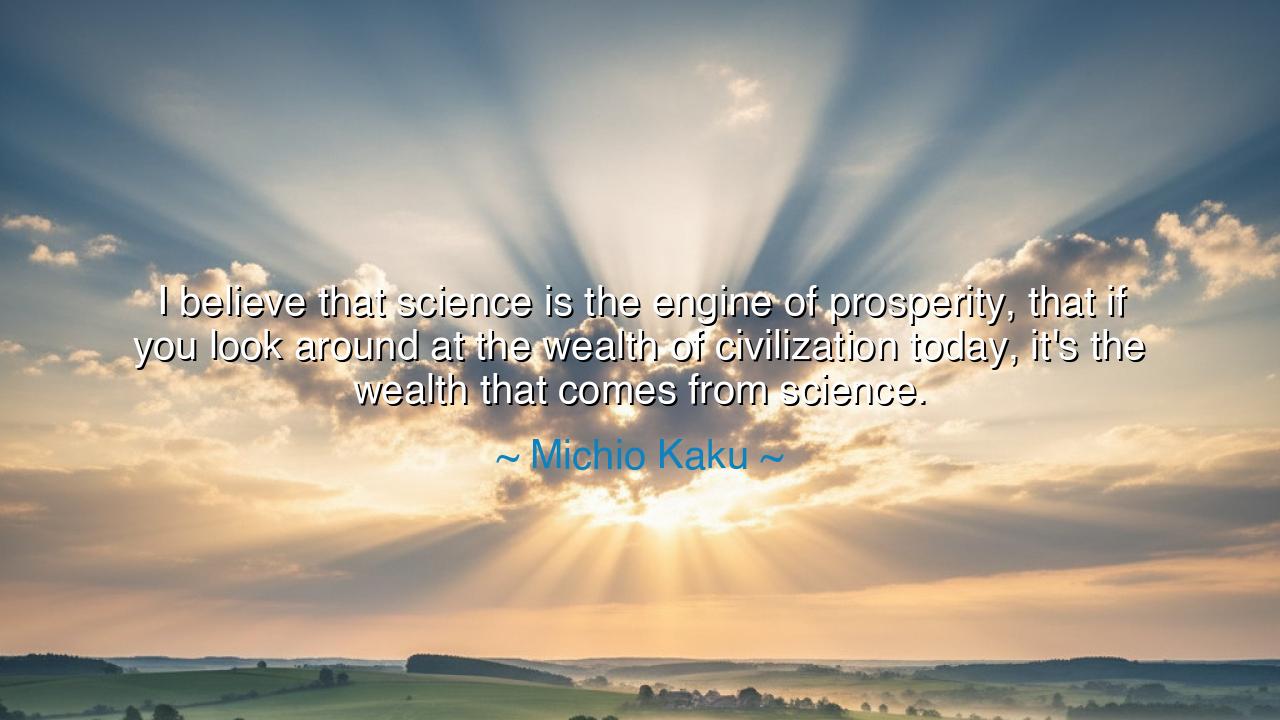
I believe that science is the engine of prosperity, that if you
I believe that science is the engine of prosperity, that if you look around at the wealth of civilization today, it's the wealth that comes from science.






Listen, O children of wisdom, to the words of Michio Kaku, a man whose vision of the future stretches far beyond the bounds of the present. He said, "I believe that science is the engine of prosperity, that if you look around at the wealth of civilization today, it's the wealth that comes from science." With these words, Kaku speaks not only to the role of science in the wealth of nations but to its very essence as the driving force behind progress and innovation. It is not the gold of kings or the riches of the earth that have brought about the prosperity of civilization, but the boundless potential unlocked by the pursuit of knowledge. Science, in its many forms, is the engine that powers the growth of society, shaping the world we live in and propelling us toward a future of limitless possibility.
In the ancient world, the great minds were driven by the pursuit of knowledge and understanding. Plato, in his Republic, spoke of the philosopher-king, a ruler who was not just wise in governing but in understanding the very nature of reality. For Plato, the pursuit of truth through reason and science was the highest form of human endeavor. Similarly, Aristotle saw the study of the natural world as the key to understanding the universe and its workings. The ancients understood that the progress of humanity rested not in material wealth but in the wealth of knowledge. This idea, that science is the true source of wealth, has endured through the centuries, and it is what Kaku affirms in his words.
Consider, O children, the example of Isaac Newton, whose work in mathematics and physics laid the foundation for much of modern science. Newton's insights into the laws of motion and gravity not only changed the way we view the universe but set the stage for the industrial revolution—an era that brought about unprecedented economic growth and technological innovation. The wealth of the modern world, from the factories of the Industrial Age to the information technology that connects us today, is rooted in the discoveries of minds like Newton, who saw the potential of science to shape the world and improve the lives of millions. The engine of prosperity that Kaku speaks of was set in motion centuries ago, and it is still driving the growth of civilization today.
Kaku also reminds us that the wealth we enjoy today is not a gift from nature or chance, but the product of centuries of scientific inquiry and discovery. The advances in medicine, transportation, communication, and energy have all come about through the diligent work of those who sought to understand the world and harness its forces. The printing press, electricity, telephones, and computers—these innovations were not born from the desire for profit alone, but from the pursuit of knowledge and the application of science to solve human problems. Each new invention, each breakthrough, is a testament to the power of science to shape the world for the better, to create prosperity where once there was none.
Now, O children, let us turn our gaze to the future, for Kaku’s vision is not just a reflection of the past, but a blueprint for the world to come. The challenges of the modern age—climate change, energy crises, disease, and global inequality—will not be solved through wishful thinking or tradition, but through the application of science. Just as science transformed the world in the past, so too will it be the key to addressing the crises that lie ahead. The clean energy revolution, the advances in medicine that will one day cure diseases, and the exploration of space to find new frontiers for human civilization—all these will be the fruits of scientific innovation. The engine of prosperity is still moving, and it is up to you, O children, to keep it turning, to fuel it with your curiosity, imagination, and dedication.
Let the example of Albert Einstein guide you, who, with his theory of relativity, transformed our understanding of space and time. But his influence went beyond the realm of physics. Einstein’s insights have shaped the modern world in ways we often take for granted—from GPS systems that rely on his theories of space-time to the atomic energy that powers nations. Einstein understood that science was not just about understanding the world but about changing it, about using knowledge to improve the human condition. His work is a shining example of how science is the engine of progress—an engine that can create wealth, peace, and a better future for all.
So, O children of the future, take these words to heart. The wealth of the world is not found in the accumulation of material possessions, but in the knowledge we gain through science and technology. Just as the ancients believed that the highest form of human endeavor was the pursuit of truth, so too must you strive to build a future founded on the scientific method—a future where discovery leads not only to material prosperity but to the flourishing of humanity. The road ahead may be filled with challenges, but the engine of prosperity is there, waiting for you to fuel it with your efforts, your passion, and your dedication to the pursuit of knowledge. May you rise to the challenge, knowing that the future of civilization rests in your hands.






AAdministratorAdministrator
Welcome, honored guests. Please leave a comment, we will respond soon